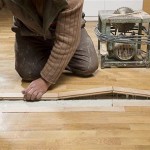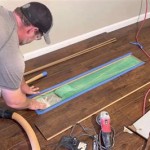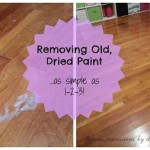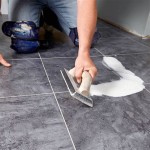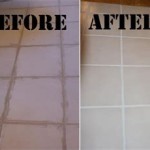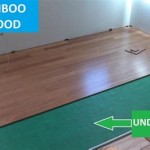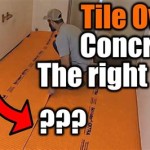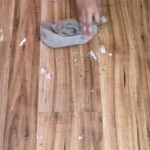What Is Best For Basement Flooring Over Concrete?
Basements offer valuable extra space in a home, whether finished or unfinished. Choosing the right flooring for a basement, however, requires careful consideration due to the unique conditions below ground. Concrete basement floors are prone to moisture, temperature fluctuations, and potential flooding. Therefore, the ideal flooring must be durable, moisture-resistant, and comfortable. This article explores various flooring options suitable for basement installation over concrete, outlining their advantages and disadvantages.
Epoxy Coatings
Epoxy coatings provide a seamless, durable, and moisture-resistant finish for concrete basement floors. They are resistant to stains, chemicals, and abrasions, making them ideal for workshops, utility rooms, or play areas. Epoxy coatings are available in various colors and finishes, allowing for customization to match any décor. The application process involves thoroughly cleaning and preparing the concrete surface before applying the epoxy mixture. While DIY kits are available, professional installation is often recommended for optimal results. One downside to epoxy is its hardness, which can make it uncomfortable to stand on for extended periods. Adding mats or area rugs can mitigate this issue.
Vinyl Flooring
Vinyl flooring is a popular choice for basements due to its affordability, moisture resistance, and ease of installation. Available in sheets, tiles, and planks, vinyl offers a wide range of styles and designs, mimicking the look of hardwood, stone, or ceramic tile. Luxury vinyl plank (LVP) and luxury vinyl tile (LVT) are particularly well-suited for basements as they offer enhanced durability and water resistance. These products often feature a click-lock installation system, making them a viable DIY project. Vinyl flooring provides a comfortable surface underfoot and is relatively easy to clean and maintain. However, it can be susceptible to damage from sharp objects and may not be as durable as other options like epoxy or tile.
Tile Flooring
Ceramic and porcelain tiles are excellent choices for basement flooring due to their exceptional water resistance and durability. They are impervious to moisture, making them ideal for areas prone to spills or flooding. Tile comes in a wide array of colors, sizes, and patterns, offering design flexibility. While tile itself is waterproof, the grout lines can be susceptible to moisture penetration. Therefore, using a high-quality grout sealer is crucial. Tile installation can be a more complex and time-consuming process than other options, often requiring professional expertise. While durable, tile can be cold underfoot, especially in basements. Using underfloor heating systems can address this issue and enhance comfort.
Engineered Hardwood
Engineered hardwood offers the aesthetic appeal of natural wood with enhanced stability and moisture resistance compared to solid hardwood. It is constructed with layers of plywood topped with a veneer of hardwood, making it less susceptible to warping or buckling in humid environments. While engineered hardwood can tolerate some moisture, it’s not entirely waterproof. Therefore, it’s essential to address any moisture issues in the basement before installation and maintain proper humidity levels. Engineered hardwood provides a warm and comfortable surface underfoot and adds a touch of elegance to the basement space. However, it is generally more expensive than vinyl or laminate flooring.
Laminate Flooring
Laminate flooring is a budget-friendly option that mimics the look of hardwood or tile. It is constructed with a core layer of fiberboard topped with a decorative layer and a wear-resistant protective layer. Laminate is relatively easy to install with a click-lock system, making it a suitable DIY project. While some laminate products offer moisture-resistant properties, they are not entirely waterproof. Standing water can damage the core layer, leading to swelling and warping. Therefore, it's essential to address any moisture concerns before installing laminate flooring in a basement.
Rubber Flooring
Rubber flooring is a durable and resilient option well-suited for basement gyms, playrooms, or workshops. It offers excellent shock absorption, making it comfortable underfoot and reducing noise. Rubber flooring is also water-resistant and easy to clean. It's available in tiles, rolls, and interlocking mats, providing installation flexibility. While rubber flooring is highly functional, its aesthetic appeal may not be suitable for all basement applications.
Concrete Sealers
For a simple and cost-effective solution, concrete sealers can enhance the appearance and durability of the existing concrete floor. Concrete sealers protect the concrete from moisture penetration, stains, and dust. They are available in various finishes, including matte, satin, and gloss. Some sealers also contain pigments to add color to the concrete. While sealers provide a basic level of protection, they do not offer the same level of comfort or design flexibility as other flooring options.
Selecting the right basement flooring requires careful evaluation of the basement's specific conditions, budget, and intended use. Considering the advantages and disadvantages of each flooring option will help homeowners make informed decisions and create a functional and aesthetically pleasing basement space.

What Is The Best Flooring To Put On A Concrete Basement Floor

What Are The Best Flooring For Basement In Homes

6 Inspiring Ideas For Basement Flooring In Portland

Best Basement Flooring The Warmest Floor Covering Is Cork

Best Flooring For Basement Renovations

How To Choose The Right Floor For Your Basement Gc Flooring Pros

What Is The Best Flooring For A Concrete Floor Basement Illinado Llc

What Is The Best Flooring For Basements Get Pros And Cons

Thermaldry Basement Flooring Systems Waterproof

Best Basement Flooring Systems Over Concrete Options And Ideas
See Also
